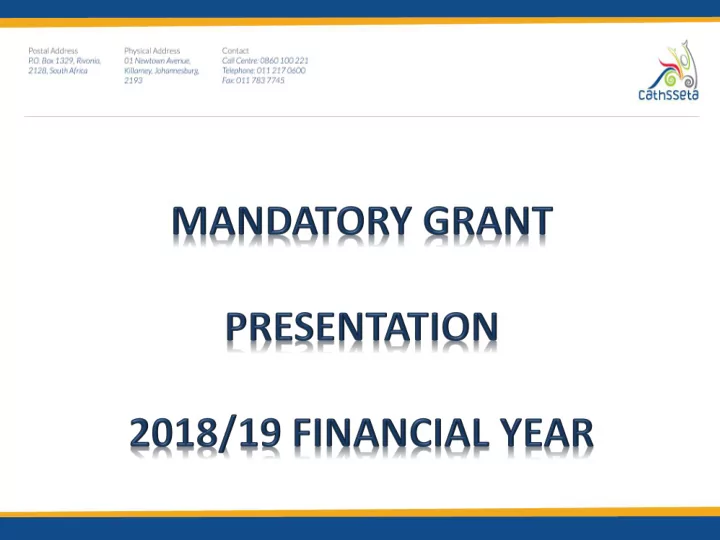

• CATHSSETA Sub-Sectors • Online Application • Application Criteria • Evaluation Criteria • Constitution of a Training committee and Purpose • Cycle for planning and report • Mandatory Grant Payment Cycle
CATHSSETA Subsectors • Arts, Culture & Heritage • Travel and Tourism services • Hospitality • Sport and Recreation • Gaming & Lotteries • Conservation
On-line Application • Funding: Mandatory grant applications (WSP) are funded by 20% of the total levies paid by the employer who submits a Mandatory Grant application. • Online submission: Applications are submitted online by registered SDFs • Bulk functionality : CATHSSETA provides an opportunity for all employers with over 1,000 employees to upload via a bulk functionality.
Application Criteria • All applications: application submissions are acknowledged through a system-generated letter. • Compliance: applications received are required to meet compulsory compliance requirements as set out in Section 7 of the Mandatory Grants Policy. This included the following: (a) Registration with the commissioner in terms of section 3(1) of the Skills Development Levies Act; (b) Evidence that the entity is up to date with levy payments as prescribed by Section 6 of the Skills Development Levies Act; (c) Submission of a properly authorised Mandatory Grant application ;
Application Criteria - Continued (d) A training committee in place which is properly constituted; (e) Evidence that the entity has conducted training committee meetings; (f) Submission of proof of training; and (g) Supporting evidence of training is not required for the first time. Failing above compliance you will be automatically rejected and no further submissions can be accepted at this stage as that compromises compliance to regulations .
Evaluation Stage • Outcome of Application : applications are either accepted or rejected and the applicants receive a letter informing them of the results, including payment dates; • Site visit : CATHSSETA may need to conduct a site visit to verify submitted information; • In a case a site visit is required, CATHSSETA will send a notification to the organisation, indicating the information required as part of the evaluation; • Rejection: If rejected after validation and a site visit, the organisation is given an opportunity to appeal CATHSSETA’s decision; and • Appeal : The Appeal process will be clearly stated in the rejection letter as well as reasons for rejection.
Evaluation Criteria The Evaluation Criteria is based on the four pillars of good skills development practices framework, namely: • Training: Promotion of training and development of people in the workplace, unemployed as well as meeting social development initiatives; • Compliance: Building on compliance with legislation, especially the regulatory framework for skills development; • Equity: Promoting equity in line with the NSDS principles; and • Accreditation: Promoting accredited training aligned to the NQF.
Training Committee • Training committee : Employers who employ 50+ employees must have a workplace training committee in place. • CATHSSETA requires that the Training Committee must be a minimum of 5 members consisting of: Employee representatives x 2 Skills Development Facilitator (SDF) Employer representatives x 2
Purpose of Workplace Training Committee This forum must be representative of all parties that have an interest or who are affected by any training decisions taken by the organisation.
Important to Note Sign- off (recognition agreement) - The large employers will be required to provide a recognition agreement to CATHSSETA to ensure that the Mandatory grant submission has been subject to a consultation process. OFO Codes – Current OFO codes is version 2015. Original documents to be submitted - Signed Authorisation page and Banking details forms with confirmation letter from the bank or a copy cancelled cheque.
Proof of Training • Signed Attendance Registers signed by the recipient of the training intervention. The Attendance Register should contain the following information: Learner / employee first name and surname Learner / employee identity number The name of the programme, or intervention Date and venue where the training took place Training provider’s name Learner / employee signature. • Copies of certificates • Statements of results NB: Copies of invoices and payments to training providers or consultants (external) who provided the training / intervention; are not acceptable as proof of training.
Deadline Extension • Extension only considered under exceptional circumstances; • Written request for extension must be made at least 15 days prior to the submission deadline; • Must provide detailed reasons why the submission deadline not met and must demonstrate that these reasons were beyond the control of the applicant; • Upon receipt of the letter, the CATHSSETA Accounting Authority will review the request and the employer be notified of the outcome; and • Access to system : Only organisations granted extension will access the system to complete and submit their Mandatory Grant application within a specified time frame.
Planning: WSP Reporting: ATR January 2018 January 2017 December 2018 December 2017 *Reporting cycle follows previous period’s Planning cycle
Reasons for Rejection • Authorisation page not signed by all respective constituencies; • Training Committee not properly constituted; • Not meeting the deadline; • No relevant proof of training submitted; • Training planned did not taking place; • Training reported does not correspond with Training Planned the previous year and no reasons provided; • Mandatory Grant submission not properly completed and does not contribute to the Sector Skills Plan; and • Did not click submit during submission period (Pending status)
2017/18 Submission Medium Small Firms Large Firms Grand Total Period Firms No of application 713 376 248 1337 received No of application 634 323 227 1184 approved No of application 79 53 21 153 rejected
SUBMISSION SUBMISSION PAYMENT TARGET DATE TYPE SCHEDULE September 2018 Mandatory Grant December 2018 Levy Payers (SDF) 30 April 2018 application March 2019 June 2019
Recommend
More recommend